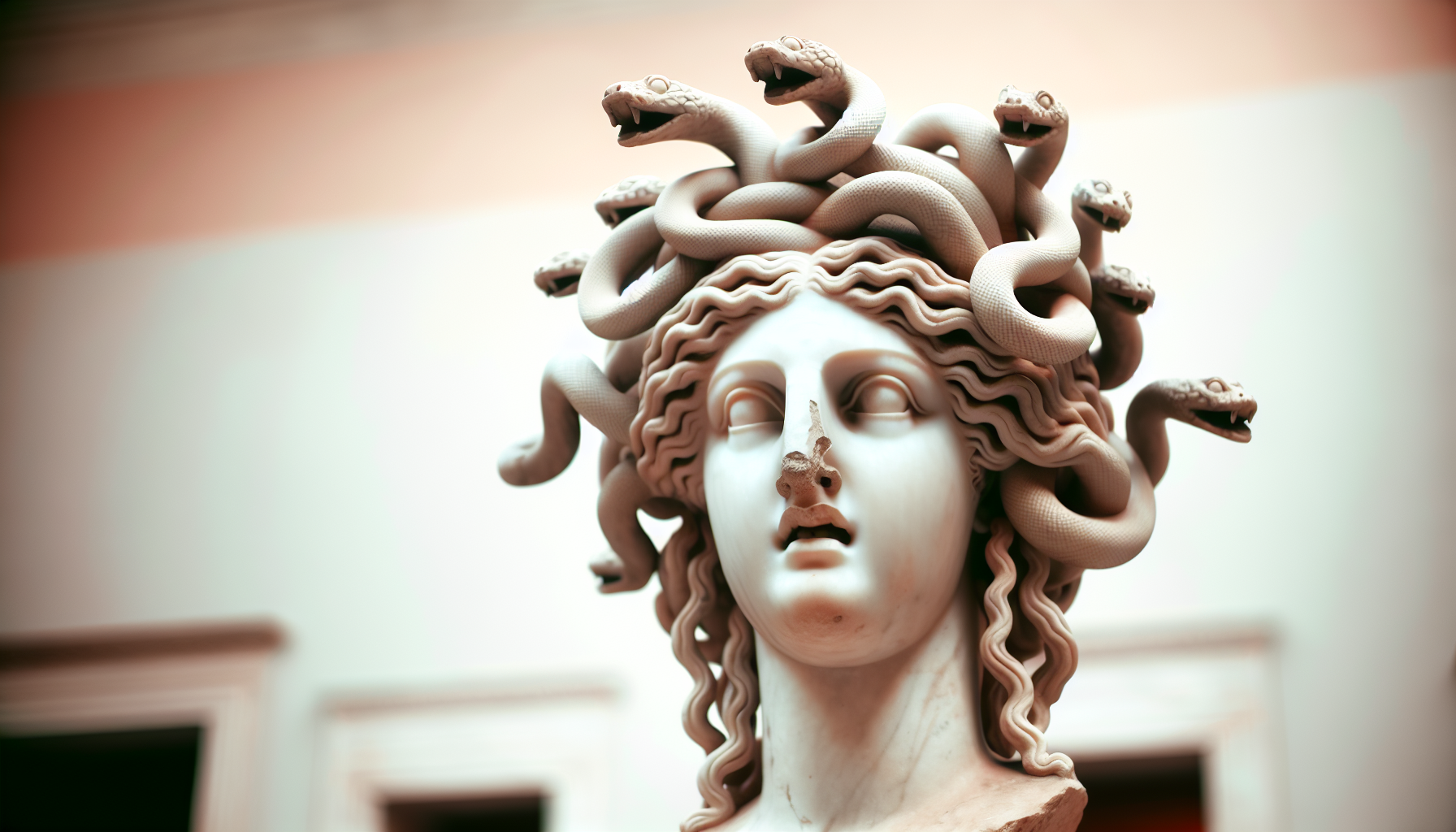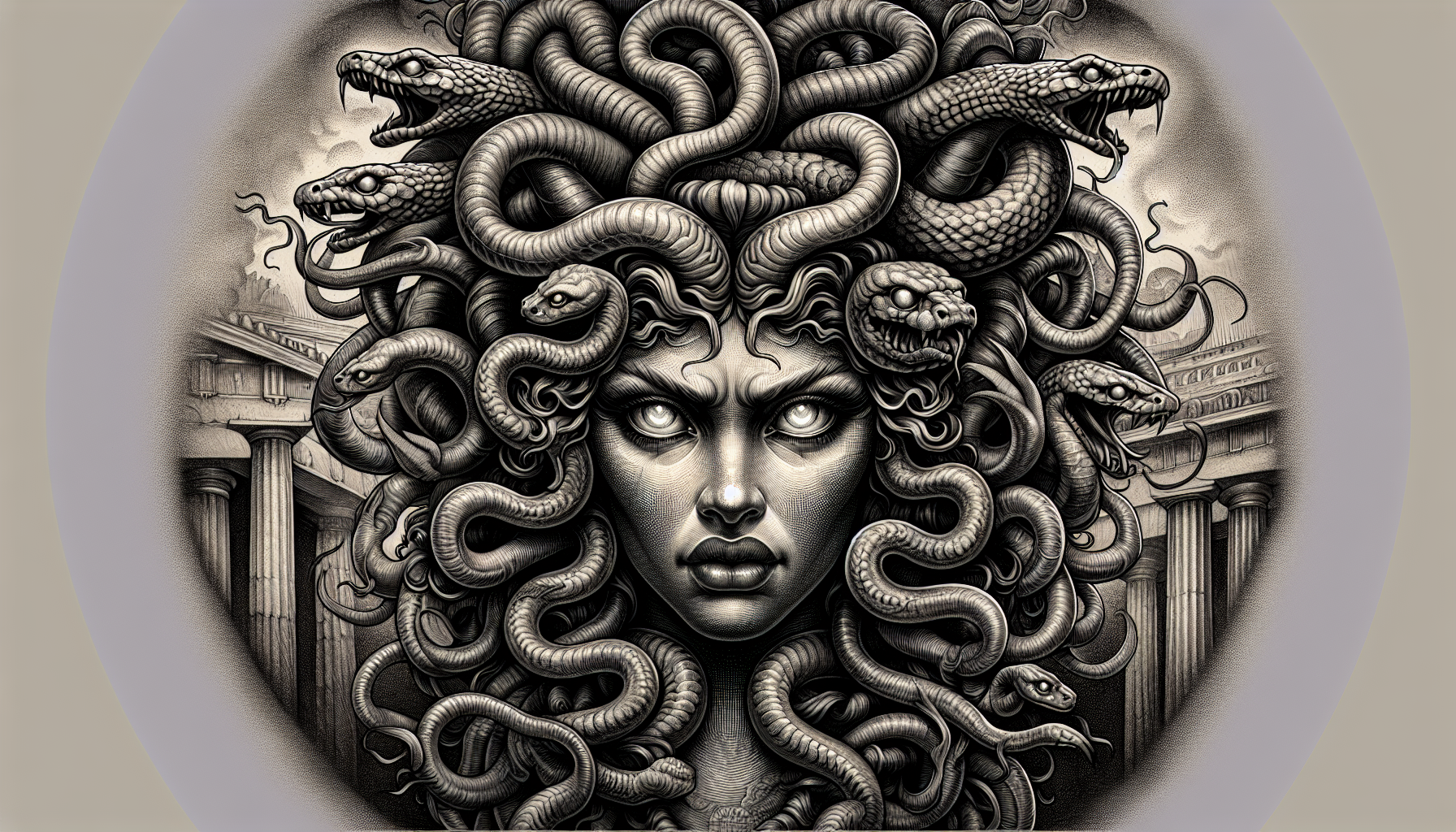Delving into the world of tattoo art, one figure stands out for her rich history and deep symbolism – Medusa. This snake-haired woman from ancient Greek mythology has become a popular choice for tattoo enthusiasts, embodying a compelling narrative of transformation, power, and protection. The Medusa tattoo meaning is deeply rooted in these themes, making it an intriguing and powerful design choice for many.
Key Takeaways
- Medusa is a powerful symbol of transformation, representing female empowerment and personal growth.
- Popular for its cultural significance and aesthetic appeal, Medusa tattoos reflect the wearer’s individual interpretation of the myth.
- Proper aftercare and regular upkeep are essential for preserving vibrancy in your tattoo long term.
Unveiling the Medusa Myth

Medusa, a striking figure from the annals of ancient Greek mythology, was one of the Gorgon sisters, known for their terrifying appearance. The Medusa myth, steeped in ancient lore, tells a tale of beauty, betrayal, and transformation. Once a beautiful maiden leading an ordinary life, Medusa’s most distinctive feature came as the result of a curse: her hair, which was transformed into a writhing mass of venomous snakes. This mortal Medusa, a prominent character in Greek mythology, continues to captivate audiences with her tragic story.
Medusa’s metamorphosis encompassed both physical and symbolic aspects. Once an ordinary woman, she became an extraordinary symbol of power and protection, her image forever etched in the minds of those who dared to look upon her.
From Beauty to Beast: The Curse of Athena
Medusa’s metamorphosis began with a terrible violation. Poseidon, the god of the sea, assaulted her within the sacred confines of Athena’s temple. This transgression ignited the wrath of Athena, the virgin goddess of wisdom and warfare, in her very own Athena’s temple. Rather than punishing Poseidon, Athena directed her ire towards the hapless Medusa, warping her lovely hair into a mass of venomous snakes and cursing her with a gaze that could turn any living being into stone. Thus, Medusa became the punished Medusa, a tragic figure in Greek mythology.
The tale of Medusa’s transformation is a potent narrative, rich in symbolism. It’s a story of punishment and power, of violation and vengeance. Within the realm of tattoo artistry, these themes are profoundly echoed, rendering the Medusa tattoo a beacon of female empowerment and resilience.
Medusa’s Head: A Symbol of Protection
Beyond her monstrous appearance, the decapitated head of Medusa, known as the “gorgoneion,” held significant cultural importance. It was believed to have the power to ward off evil and protect against harm, making it a popular protective emblem in various ancient cultures. The gorgoneion was deployed as a decorative motif, an amulet, and an apotropaic device, used to repel malevolent forces.
Within the sphere of tattoo artistry, Medusa’s head, a protective symbol, continues to bear this ancient significance. It is often chosen for its perceived apotropaic qualities – warding off negative energies and providing protection. Furthermore, it symbolizes survival, strength, and resilience, making it an emblem of protection and power in the body ink narrative.
The Intricacies of Medusa Tattoo Art

A traditional Medusa tattoo isn’t just a mere aesthetic choice; it’s a deeply personal symbol. The complex design often showcases a monochrome depiction of Medusa’s head, inclusive of her snake hair, representing an individual journey of transformation and self-discovery. These tattoos offer a canvas for individual expression, reflecting the wearer’s unique interpretation of the Medusa myth.
While many Medusa tattoos adhere to the traditional black and white palette, some artists infuse color into their designs, adding depth and dimension to the image. The choice of design varies widely, reflecting the wearer’s personal style and the artist’s interpretation of the myth. The spectrum of options spans from traditional American tattoos to contemporary designs embodying strength and power, displaying a diversity as multifaceted as Medusa’s narrative.
Snake Hair and Stony Stare
The snake hair and stony stare are the key features that make a Medusa tattoo instantly recognizable. The serpentine locks represent transformation, renewal, inner power, and serve as a warning against vanity and arrogance. Her gaze, capable of turning anyone into stone, symbolizes power, intensity, and the balance of power between gods and mortals.
Medusa’s petrifying gaze is interpreted in myriad ways across various tattoo styles. Some incorporate abstract elements like snakes or Greek motifs, while others strive to capture the lifelike intricacies of her stare, demonstrating the diverse ways in which Medusa’s formidable presence can be interpreted.
The Artist’s Touch: Selecting the Right Tattoo Artist
The right artist can bring the Medusa myth to life on your skin, capturing her power and beauty in intricate detail. A thorough comprehension of Greek mythology is imperative for the artist to both honor the heritage and encapsulate Medusa’s associated symbolism.
When selecting an artist for your Medusa tattoo, it’s important to evaluate their:
- understanding of Greek folklore
- artistic ability
- meticulousness
- technical proficiency
- effective communication skills
By considering these qualities, tattoo enthusiasts can find an artist capable of creating a stunning Medusa tattoo that resonates with their personal journey and embodies the symbolism they wish to carry with them.
Medusa Tattoos: Emblems of Female Empowerment

More than a mere image, the Medusa tattoo stands as a potent symbol. For many women, this tattoo represents female power, freedom, and transformation. The Medusa story serves as a symbol of strength and resilience, offering a sense of empowerment and survival after traumatic experiences.
These tattoos are seen as emblems of personal transformation, symbolizing the wearer’s journey of self-discovery. They echo the wearer’s innate power and capacity to surmount adversity, rendering the Medusa tattoo a potent emblem of female empowerment.
Reclaiming Control: Medusa and Feminism
The Medusa story resonates deeply with feminists. It reflects the struggle for women’s rights and portrays formidable women challenging the patriarchal society. It serves as a symbol of:
- female monstrosity
- power
- highlighting the oppressive dynamics of patriarchal societies
- emphasizing the importance of women reclaiming their autonomy.
From victim to vanquisher, the story of Medusa mirrors the struggles of oppressed women, serving as a symbol of powerlessness and a cautionary tale of female decapitation. As the Roman author Ovid describes, it underscores the need for women to reclaim their autonomy and advocate against oppression.
Personal Transformation Through Ink
A Medusa tattoo may serve as an intensely personal symbol, reflecting the wearer’s transformative journey and self-discovery. It is a tribute to the wearer’s resilience, symbolizing their strength in overcoming past traumas. So, what does a medusa tattoo mean in this context? It represents the power of transformation and the ability to rise above adversity.
For survivors of sexual assault and other forms of sexual violence, the Medusa tattoo offers a profound message of strength and survival. It serves as a reminder of their resilience, their ability to overcome their past, and their journey towards personal transformation.
Cultural Significance and Popularity of Medusa Tattoos

With a significant cultural value, Medusa tattoos have garnered considerable popularity. They are perceived as a protective symbol, believed to ward off malevolent forces and negative influences. The Medusa tattoo’s powerful symbolism, striking aesthetic, and representation of female power and resilience have contributed to its increasing popularity.
These tattoos symbolize various meanings such as female empowerment and personal transformation, making them a popular choice among tattoo artists and enthusiasts alike. The rich history and deep symbolism of Medusa tattoos continue to captivate and inspire, making them a timeless choice in the world of body art.
A Symbol Across Cultures
The symbolism of Medusa transcends cultures. In some societies, she is perceived as a fearsome figure symbolizing peril and deadly allure, while in others, she is revered as a representation of female intellect and sagacity. Medusa’s iconic symbol in Greek mythology, linked to power and metamorphosis, has led her to be a recurring figure in various belief systems.
The fascination with Medusa’s story and her enduring image throughout history make her a recurring figure in art, literature, and popular culture. Her unique characteristics, such as her snake hair and ability to turn people to stone, contribute to her popularity and intrigue, making her an influential figure across cultures.
Why Get a Medusa Tattoo?
People choose Medusa tattoos for their powerful symbolism. These tattoos represent female empowerment, personal growth, and protection, resonating deeply with those who wear them. They serve as a reminder of the wearer’s personal power, their ability to overcome adversity, and their journey towards personal transformation.
Choosing a Medusa tattoo is a deeply personal decision, reflecting the wearer’s unique interpretation of the myth and their personal journey. Whether you’re drawn to the Medusa tattoo for its striking aesthetic, its rich history, or its deep symbolism, it’s a choice that carries a powerful message.
Caring for Your Medusa Tattoo

Upon acquiring your Medusa tattoo, meticulous care is paramount in preserving its vibrancy and fostering a smooth healing process. Immediately post-tattoo, adhering to the aftercare procedures advised by your tattoo artist is vital. This includes cleaning and moisturizing the tattoo once or twice a day.
The recommended aftercare products for a Medusa tattoo include H2Ocean’s Piercing Aftercare Spray and NeilMed Wound Wash Spray. These products are specifically formulated to promote proper healing and should be applied twice daily. With proper care, your Medusa tattoo will heal beautifully, preserving its intricate details and rich symbolism for years to come.
Healing Process and Aftercare
The healing process of a Medusa tattoo commonly spans over 6-12 weeks, contingent upon factors like the individual’s immunity, overall health, and compliance with aftercare procedures. Proper cleaning is essential during this period. Gently cleanse the tattoo with fragrance-free soap and water, then pat it dry and apply a natural moisturizer like Tatloc Tattoo Balm.
Adhering to aftercare instructions is critical to guarantee a seamless healing process and sustain the vibrancy of your Medusa tattoo. This includes minimizing sunlight exposure to prevent fading and considering regular touch-ups to preserve the tattoo’s original appearance.
Preserving the Vibrancy of Your Tattoo
Maintaining your Medusa tattoo’s vibrancy necessitates consistent care and upkeep. Here are some tips to keep in mind:
- Keep it moisturized with tattoo lotion
- Shield it from direct sunlight
- Maintain a healthy lifestyle with adequate hydration, exercise, and a balanced diet
- Gently clean the tattoo and refrain from picking or scratching it during the healing process
Following these tips will help ensure that your Medusa tattoo stays vibrant and beautiful for years to come.
As the healing process progresses, you might notice a decrease in the tattoo’s initial vibrancy. This is normal. As the skin naturally sheds, the vividness of the tattoo’s colors becomes more apparent. Regular touch-ups are recommended whenever the ink begins to fade or lose vibrancy, ensuring your Medusa tattoo remains as striking as the day you got it.
Summary
In the realm of tattoo art, the Medusa tattoo stands out as a symbol of transformation, strength, and resilience. Rooted in ancient Greek mythology and reinterpreted through modern lenses, it serves as a powerful emblem of female empowerment. Whether you’re drawn to its striking aesthetic, its rich history, or its deep symbolism, the Medusa tattoo is a testament to personal growth and transformation. Remember, each Medusa tattoo is as unique as the person wearing it – a personal narrative inked on the canvas of the skin.
Frequently Asked Questions
What does Medusa symbolize?
Medusa symbolizes a protective force meant to ward off negativity, similar to the concept of the evil eye, serving as a deterrent against danger.
What does Medusa tattoo mean girls?
The Medusa tattoo has become a symbol of empowerment for women who have experienced sexual assault, allowing them to reclaim their identity and reject the idea of being cursed or punished.
Can anyone get a Medusa tattoo?
Yes, anyone can get a Medusa tattoo, but the design is often associated with symbolizing the survival of sexual assault or abuse.
Why was Medusa cursed?
Medusa was cursed by Athena because she broke her vow of celibacy and was violated by the sea god Poseidon in Athena’s temple, leading to her transformation into a monster. This unholy act in the temple of a virgin goddess so enraged Athena that she put a curse on Medusa to rid her of her beauty.
What factors should I consider when choosing a tattoo artist for a Medusa tattoo?
When choosing a tattoo artist for a Medusa tattoo, consider their understanding of Greek mythology, portfolio strength, technical proficiency, and communication skills. These factors are crucial for getting an accurate and well-executed tattoo.





